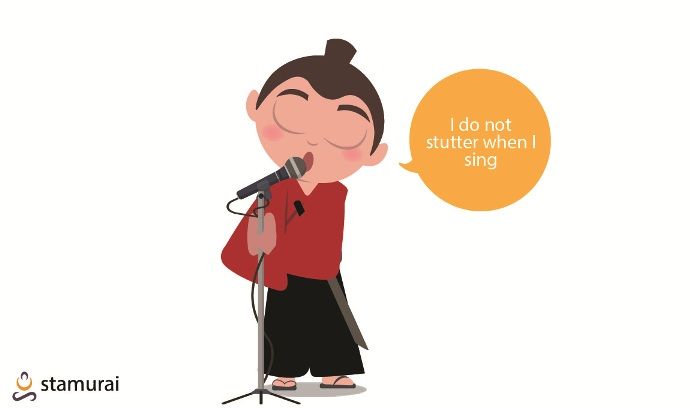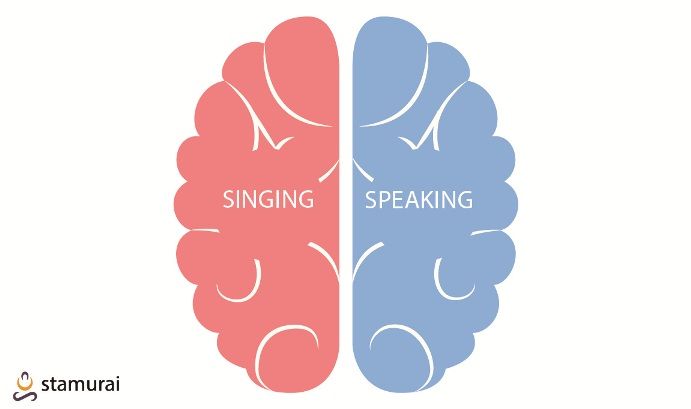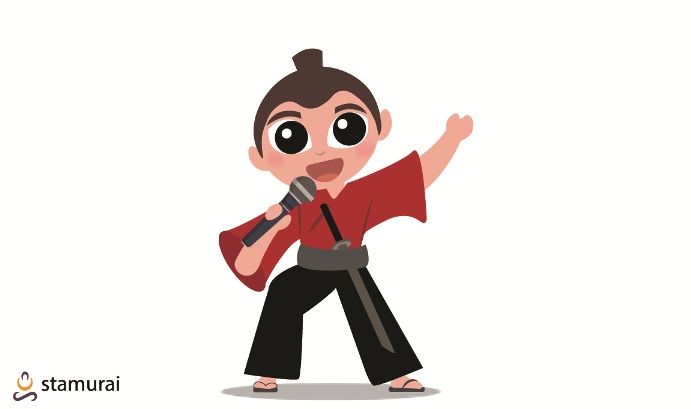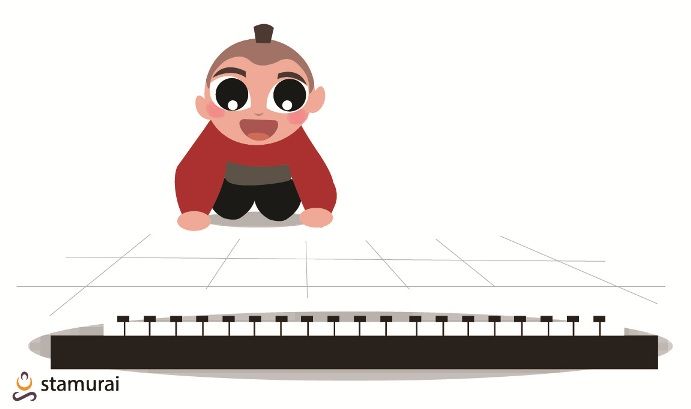What's common between Elvis Presley, Kendrick Lamar, and Ed Sheeran, besides their undeniable talent for music? They were and are prolific singers popular all across the world for their music.
These are all famous personalities with tremendous talents who began singing as an outlet because they stuttered well into adulthood. Early on, the only time they were confident was when they were either singing for their friends and family.

Sheeran, Lamar, and Carly Simon all found out that their stammering simply disappears when they sing.
Why Do We Not Stutter While Singing?
While you are likely to think that it's just a fortunate coincidence, research shows that it might not be the case.

According to Dr Barry Guitar, one of the leading personalities in modern speech pathology research –
- While singing we move our tongue, lips, and vocal cords quite differently from when we speak.
- Whether it’s a famous singer or a bathroom singer, the person doesn’t feel the pressure to communicate while singing, which they face during conversations.
- The regulation of breathing is critical in singing. Regulated breathing also helps in minimizing blocks and prolongations.
- In most cases, singers already know the lyrics by heart. There is no “word searching” that may contribute to stuttering.
- Modern imaging techniques show that the language and communication centres of the brain function differently when a person is singing as compared to when they are talking.
Successful Singers Who (used to) Stutter
Some of the most popular singers stuttered as children. Many of them stutter while talking even today! The one thing that binds them together is the freedom of expression they enjoy when they are singing.
Many of these internationally recognized singers now have Grammys, Billboard Music Awards, BBC Music Awards, and Pulitzer Prize for Music!
Here are some of the most popular examples of famous singers who struggled with stuttering at some point in their lives:
1. Ed Sheeran
Ed Sheeran may be a Grammy winning singer, but he still struggles with fluency. He credits Eminem and his rap songs to help him overcome his worst stuttering phase.
The fast pace, easy-to-remember lyrics and groovy melody helped Sheeran remain fluent when he rapped along with The Marshall Mathers LP at home as a child. That’s when Sheeran discovered the magic of music!
Singing helped Sheeran break free from stuttering. Even now the world-renowned singer struggles to get the words out when he feels overwhelmed, but singing has never let him down.
2. Kendrick Lamar
Kendrick Lamar is a 7-time Grammy and Pulitzer winning rapper and songwriter who has stuttered ever since his early childhood. Instead of giving up, he focused all his energy into making music.
His dedication, focus, and never-say-die attitude earned him critical acclaim and international fame. Today, he is one of the most distinguished songwriters of the world.
3. Chris Martin
The Coldplay lead singer had a stutter growing up. He still stutters occasionally. It didn’t stop him or his band from receiving close to 600 awards and award nominations between 2000 and 2021.
4. Kylie Minogue
Kylie Minogue is an internationally acclaimed singer and actress. She is the highest-selling Australian singer of all time.
Despite her overwhelming success, she has spoken about her struggles with speech disfluency. Singing was the only “exercise” that worked for Minogue. She began to sing more frequently to stop stuttering.
5. Megan Washington
In a now popular Tedx Talk, Megan Washington opened up about the incessant bullying she faced because of her childhood-onset stutter. Attending years of therapy helped her discover the smooth-speech technique.
Although she is not comfortable with the sing--song way of talking, she admits that it is similar to singing. Today, she stutters proudly and she focuses on her music.
6. Elvis Presley
Very few know that the beloved King of Rock and Roll used to stutter even as an adult.
If you watch his live performances closely, you will notice that Elvis does stutter while talking to the audience in between songs! However, on stage, his voice and singing are bold and effortless.
He had the dream of becoming a successful performer and he didn’t let his speech disfluency get in his way despite not receiving formal speech therapy.
Before they became world-renowned singers, songwriters and performers, they were children and teens with a stutter! However, instead of focusing on just the problem, they relied on singing as a way to express themselves.
In the long run, they discovered their love, passion and talent for music. Then, there was no stopping them!
The Therapeutic Effects of Singing
Singing is as natural as speaking. Therefore it serves as a valuable tool during stuttering treatment. Research shows that singing engages the auditory-motor feedback pathways.
Singing stimulates and strengthens the muscles involved in articulation, respiration and phonation. Intense singing practice can bring long-term changes in the pulmonary and cardiovascular systems.

Currently, the most popular stuttering treatments include fluency shaping methods. A recent study showed that singing can reduce stuttering just like other traditional fluency-enhancing techniques.
Andrews, Howier, Dozsa and Guitar observed that singing a known song for 10 minutes can reduce stuttering frequency by as much as 90% in PWS. A 2009 study conducted by Davidow, Bothe, Andreatta and Ye has shown that singing can reduce stuttering and may have a long term positive effect on the fluency of a person who stutters.
Should Your Child Be Singing Even Before They Can Learn to Talk?
We saw “magic” when American Idol contestant Lazaro went on stage and shook the entire world with one of the most heartfelt auditions. While Keith Urban was famously criticized on every possible social media for his spontaneous comment “You should sing all the time,” he did have a point.
Singing makes it easier for a person to stutter to express themselves. It is not only an avenue for self-expression, but undergoing vocal training and voice training will give any child the confidence necessary to go through daily life.

In our previous posts, we have discussed how a child who stutters may slowly develop a lack of confidence. The negative attitudes and feelings associated with stuttering can keep a person who stutters from achieving their full potential.
Just imagine, if you are a parent of a child who is struggling with speech impediments, you can always encourage your child to “sing it” to you. It is a small step that can help your child find his or her first control over breathing, phonation, and enunciation.
Introducing your child who stutters to the world of music is like handing the control of their expression back to them!
Can You Use Music to Manage Stuttering?
Using music therapy to address speech disfluency is becoming a common practice.
Rhythmic speech cueing (RSC) is a speech rate control technique that uses auditory rhythm to enhance fluency, articulation, and understandability of speech. In RSC, the client receives auditory stimulation. It is typically a continuous rhythmic pattern (background music or metronomic pulse).
The rhythm and tempo are the most important factors during RSC. Therefore, it is prudent to work with a speech therapist who has an idea about your rate of stuttering. They can set a tempo and rhythm that may be most effective for inducing fluency.
Music Lessons and Speech Therapy Can Go Hand in Hand
Speech therapy is always beneficial for someone with a stuttering problem. It is especially beneficial for a child, who has just begun to show signs of stuttering.
Early intervention in the form of speech therapy guided by an experienced speech-language pathologist (SLP) can help children overcome the struggles of stuttering, and keep the negative emotions at bay.
Addressing stuttering in children is much easier than in adults, since in the latter case, SLPs may have to deal with advanced forms of stuttering, in addition to addressing cognitive behavioural issues that arise from not being able to express one’s feelings in their desired words.
A study done in 1982 at the University of New South Wales shows that after singing, participants showed a 90% reduction in stuttering. The participants went on to show a consistent increase in phonation duration. In the case of non-fluent aphasia (the inability to speak fluently), Melodic Intonation Therapy (MIT) by Sparks, Albert, and Helm-Estabrooks, in the 70s, has shown significant improvement in speech fluency.
An introduction of guided music classes in coordination with an experienced SLP can help a child find an avenue of expression. Moreover, a child can always rely on a new skill like singing to make friends, and socialize in kindergarten, elementary school, or even in middle school!










